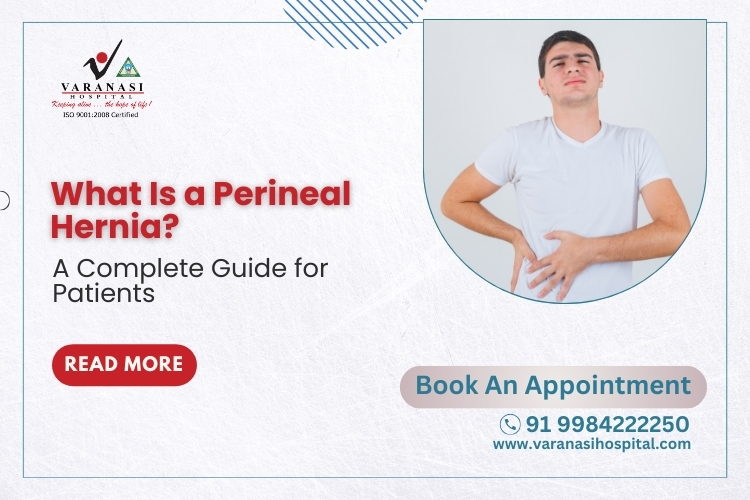
Hernias are a common condition where internal tissues push through weak spots in surrounding muscles. While most people are familiar with inguinal or umbilical hernias, perineal hernias are a much less talked-about and unique topic of disease. Also, these diseases have fewer curative treatments in the market, but other hernia problems can be cured in the same way. In this blog, the best Hernia Treatment in Varanasi will discuss the cause, symptoms, and the treatment options available in the market.
Understanding Perineal hernia
A perineal hernia occurs when internal tissues, such as fat or parts of the bowel, bulge through the pelvic floor into the perineal region, which is the area between the genitals and the anus. This hernia disease can be held either outside of the body or internally in the body, basically in the pelvic area, where the symptoms may be less obvious. Although uncommon, it can affect both men and women, though women may be more prone to it due to childbirth or pelvic surgeries.
Causes and Risk Factors
There are two main types of Perineal hernias: congenital, meaning present from birth, and acquired, which develop later in life. Acquired cases are more common and often result from:
- Previous pelvic or abdominal surgeries (especially colorectal surgeries like abdominoperineal resection)
- Chronic constipation or frequent peeing during bowel movements.
- Heavy lifting or physical overexertion
Women, especially those who have had multiple deliveries or undergone pelvic surgeries, are at a higher risk.
Symptoms to Watch For
Perineal hernias can sometimes go unnoticed, especially in early stages. However, you may experience:
- A soft itching or pain in the perineal area
- A sensation of heaviness, discomfort, or pressure, especially while sitting or standing for long periods
- Pain during movement or lifting
- Occasionally, problems with bowel or urinary function may occur if the hernia presses on nearby organs.
Diagnosis and Medical Evaluation
If you suspect a Perineal hernia, it’s important to seek medical advice. A doctor will usually begin with a physical examination. To understand the disease better, imaging tests like a CT scan and an MRI may be prescribed by the doctor. These tools help doctors understand the size and exact location of the hernia, which is essential for planning treatment. If you want a good doctor for your hernia surgery, then contact the Best Hernia Surgeon in Varanasi, and enjoy your life without having any tension.
Treatment Options
For mild or symptom-free cases, doctors might suggest watchful waiting along with lifestyle adjustments. However, in most cases, surgical repair is necessary, especially if the hernia is growing or causing discomfort. Surgical options include:
- Open surgery: where the doctor treats the hernia through a larger incision.
- Laparoscopic or minimally invasive surgery: a less harmful way using small incisions and a camera for guidance.
Recovery times can vary, but most patients return to normal activity within a few weeks after surgery.
Managing Life with a Perineal hernia
While waiting for treatment or post-surgery, certain lifestyle changes can help manage
symptoms:
- Avoid lifting heavy objects
- Follow a fiber-rich diet to prevent constipation.
- Perform pelvic floor strengthening exercises (as recommended by a doctor)
Regular follow-ups and staying in touch with your doctor can prevent complications and help monitor recovery.
Final Thoughts
Though rare, perineal hernias can have a significant impact on your comfort and health if left untreated. The good news is that with timely diagnosis and proper treatment, most people recover fully and return to a normal lifestyle. Also, many people with this disease can’t survive with pain for too long; the proper treatment can give them a happy and healthy life. If you are looking for the best multispecialty hospital in Varanasi, then visit the best Multispecialty Hospital in Varanasi, the Varanasi Hospital, and get a happy and healthy life.
Also Read: Dos and Don’ts Before Hernia Surgery – Learn from the Best Hernia Surgeon in Varanasi
Book Appointment Today!
Recent Post
-
 AI And Robotics In Colorectal Surgery: A New Era Of Precision Medicine
AI And Robotics In Colorectal Surgery: A New Era Of Precision Medicine -
 Appendicitis In Children: Symptoms And Treatment You Shouldn’t Ignore
Appendicitis In Children: Symptoms And Treatment You Shouldn’t Ignore -
 Why Laparoscopic Surgery Is Becoming the Preferred Choice Worldwide
Why Laparoscopic Surgery Is Becoming the Preferred Choice Worldwide -
 Gallstone Symptoms in Men and Women: What’s the Difference?
Gallstone Symptoms in Men and Women: What’s the Difference? -
 What Is a Perineal hernia? A Complete Guide for Patients
What Is a Perineal hernia? A Complete Guide for Patients
TESTIMONIALS
B-50, Jawahar Nagar Extention, Gurudham Colony, Bhelupura, Varanasi – 221010.





